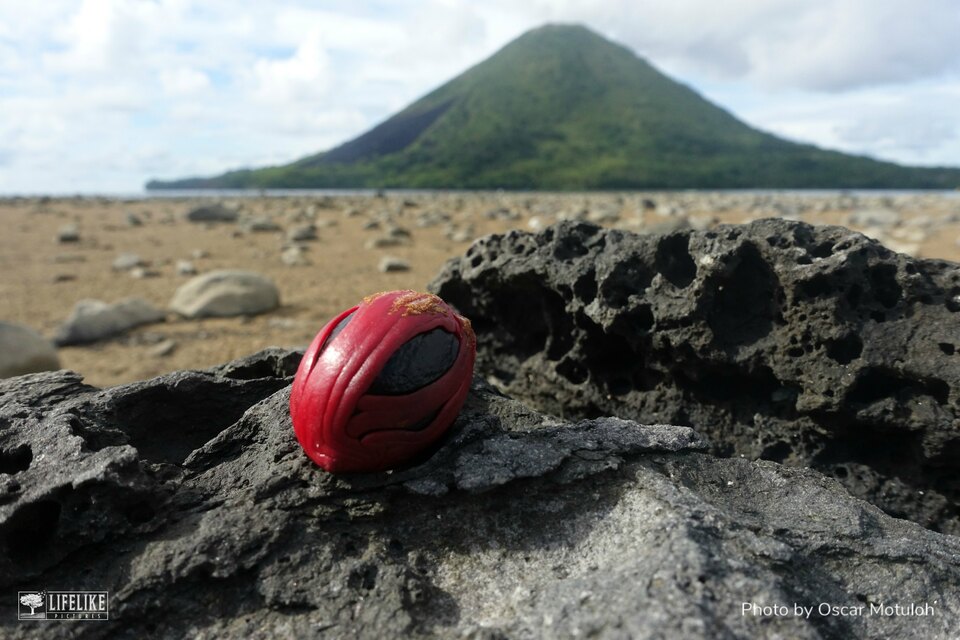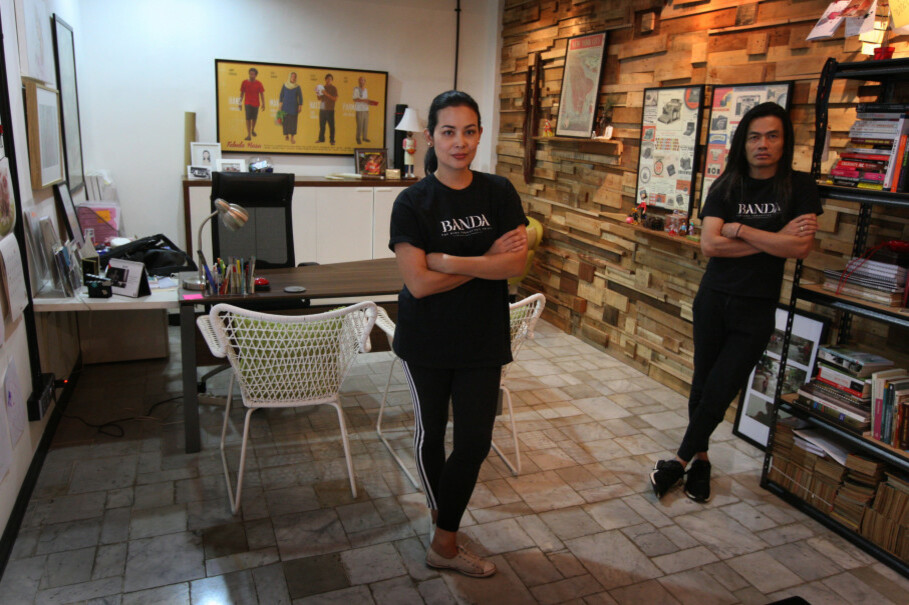'Banda: The Dark Forgotten Trail,' a Timelapse of Little-Known Indonesian History

Jakarta. The Chinese came, and then the Arabs, to trade with the people of Banda Islands in the seventeenth century, searching for spices that added flavor to food and lives of people in more established parts of the world. The Silk Road carried them to Europe, where they were valued not only for their aroma and flavor, but also for their ability to keep meat from spoiling. Among the most sought-after spices, worth more than its weight in gold at that time, was nutmeg, which could only be found in the remote southern islands.
The Europeans, having mastered the art of sailing, pushed eastward to find the source of these rich ingredients. First came the Portuguese, then the English and then the Dutch. The lodestone of the spice islands was a tiny archipelago of islands called Banda in Maluku — then the world's only known source of nutmeg.
Banda is better known for its part in the most lopsided landswap deal in European colonial history, when the British swapped Run, one of the islands in Banda, with a tiny island in North America then controlled by the Dutch. That flat, boring piece of land is now called Manhattan.
Very few people, including Indonesians, know of Banda's bloody colonial history and its domination by foreign powers for more than 400 years.
Now famous among divers for its underwater beauty, the Banda Islands have been witness to many historical events that shape Indonesia today.
The Dutch was determined to control this far-flung part of the world for the nutmeg. Not content just to trade, they wanted to establish a monopoly of the rare spice.
The ruthless Dutch East India Company (VOC) governor-general Jan Pieterszoon Coen was angered by the islanders who kept selling nutmeg to the British despite an agreement to deal only with the Dutch that he ordered a genocide against them. Thousands died, and were replaced by more submissive islanders from other parts of the archipelago.
Centuries later, Banda became a place of exile for rebellious political leaders of who were fighting for Indonesia's independence. The country's founding fathers Mohammad Hatta and Sutan Sjahrir were exiled to Banda together from 1935 to 1942.
In 2017, producer Sheila Timothy and director Jay Subyakto finally shed a light on Banda's almost forgotten history with a new documentary called "Banda: The Dark Forgotten Trail."
"It is a forgotten history we're telling," Sheila, who goes by the nickname Lala, told the Jakarta Globe. "The name Banda is not exactly at the top of everyone's list. Whenever I say the word, Banda, most people think of Banda Aceh. 'Dark' in the title means that most of us don't know much about our history, even though Banda actually has so many stories to tell us."
Lala was inspired to make a documentary about the old spice route after attending an art exhibition a few years ago, during which one of the displays, entitled "The Silk Road Existed Because of the Spice Trail," sparked ideas for the film.
Lala assembled an all-star team, including scriptwriter Irfan Ramli ("Cahaya dari Timur: Beta Maluku," "Surat dari Praha," "Filosofi Kopi 2: Ben & Jody"), who is a history buff, and director Jay Subiakto — better known for his video clips and choreographic work.
Lala said even though Jay had never worked on a feature-length film of any sort, his style was perfect for the documentary.
"Everything he's made is so Indonesian. But always packaged in a unique and appealing way for the audience," she said.
"I Googled his name, and found an interview where he said he wanted to make a documentary."
Offering Jay the director's chair proved to be serendipitous: the flamboyant aesthete had long been fascinated by Banda. "I had gone photo-hunting to Banda Neira [one of the islands in the Banda archipelago] with a friend. Hatta, who was exiled to the island, was actually my uncle, so I'd heard stories about the place from my parents and the man himself. When Lala told me she wanted to make a movie about Banda with me, it was something I had always been dreaming of," Jay recalled.
Jay had wanted the film to tell several stories all set in the remote archipelago: the Banda islanders' oppression by their colonial masters, the exile of prominent Indonesian statesmen during the struggle for independence, the bloody sectarian conflict in Ambon that had spread to Banda in 1999, and the unrequited love of legendary Indonesian poet Chairil Anwar for a girl from the islands, Dien Tamaela.
Run Island's historic landswap deal with Manhattan was another story Jay had wanted to tell. "Run is in pitiful conditions at the moment. It almost doesn't even exist on the map because it's so small. Banda is now abandoned. There are at least 12 historic Dutch forts there, all built in the seventeenth century. But people who go there now are just interested in diving. They don't care about the history of the place," Jay said.
Documentary Experiment
Despite being a newcomer to the documentary business, Jay was adamant he did not want to copy someone else's style. To prepare for "Banda," he had read history books and consulted historians and watched as many documentaries as he could lay his hands on. He said he found many of them monotonous.
Visuals were Jay's top priorities, so he hired six directors of photography (DoP) from various backgrounds, including cinematographer Ipung Rachmat Syaiful, photographer and visual artist Davy Linggar and photojournalist Oscar Motuloh.
"I wanted the film to be a sort of a collage because what we were documenting was mostly inanimate objects. I didn't want any over-the-top reenactments, like having actors dressed as Dutch colonizers," Jay said. He applied a hands-on, improvisational approach, with Lala keeping everything organized.
"On the first day, I told my team that I didn't know what I wanted to make, but I was sure they would help me. I let the DoPs shoot any scenes they wanted," Jay said.
The filmmakers aimed to cover a long timespan, from the colonial era to the present day. Once they embarked on their adventure in Banda, materials seemed to come out of nowhere. They discovered unheard-of monuments, met historian Wim Manuhutu by coincidence and witnessed a meteor shower and a "super moon."
"Each day the DoPs would gather and present what they've shot to Jay. The stories kept unfolding. They kept adding up materials and the film started to take shape," Lala said.
Curtain-Raiser
Though the filmmakers made every effort to create an unconventional documentary, they said it would be hard to shake off the genre's stereotype of being unexciting. Given a choice between a documentary and a blockbuster, audiences would always choose the latter. Lala and Jay acknowledge it will be hard to achieve commercial success with "Banda."
"There are many documentary filmmakers in Indonesia. Festivals like the Indonesian Film Festival (FFI) and Film Appreciation Indonesia (AFI) feature many short and feature-length documentaries. But this type of film takes a long time to make, and is essentially non-commercial in nature. It's hard to make money from documentaries," Lala said.
Indonesian documentaries also suffer often from poor production quality, especially in sound production. According to Lala, local documentaries tend to have good visuals but poor sound quality.
Jay added, "Documentaries don't get many screens at the cinemas either, and the government often objects, 'Why are you making a documentary?’ when their job is to support us."
But Lala and Jay persisted with the format, intending to make Banda into a sort of a "curtain-raiser" for the general public to get to know more about the islands' forgotten history. Unlike the fictionalized biopic, a big hit with local cinemagoers, "Banda" contains much less historical information.
"We don't want to look like a bunch of know-alls. We consulted many historians when making this film but we made it in such a way that the audience, especially the younger generation, will want to find out more [about history] and be proud of Indonesia. Film has soft power. People can learn a lot from something masked as entertainment," Lala said.
The filmmakers, who spent 18 months on making "Banda," also want to make the documentary format more popular and more palatable to the public. "Whenever I say 'Banda' is a documentary, people tend to dismiss it. They think it's not worth watching and doesn't belong in movie theaters. They ask who the actors are, and make cheesy comments like why not make it into a fictional story, or a love story set in Banda? That would be a sin for me," Jay said half-jokingly.
Lala’s portfolio includes many difficult films, essentially mainstream works that lean toward the art film genre. "Pintu Terlarang" and "Modus Anomali" are psychological thrillers, rare in Indonesia, and the latter is in English to boot. "Tabula Rasa," a family drama, borders on an art movie.
The film's production team has partnered with sponsors that include the film as part of their corporate social responsibility (CSR) programs, used social media to share historical trivia about the Banda Islands, worked with YouTube vloggers to attract a younger audience, secured distribution deals overseas, and collaborated with community organizations to attempt to win more recognition for "Banda."
Distribution for the film will not stop at cinemas either.
"After it stops airing in cinemas, we will screen the movie in schools, so that students get to know more about our history," Jay said.
Lala said she believes young people are more curious and sensitive today, including about the country's long and bloody colonial history.
"People of my generation didn't really want to go to museums, for instance, but young people today are more inquisitive. They're interested to learn more about Indonesian history and culture, but they need 'triggers,' like this film. It's our task as filmmakers to influence them to trace back their roots."
With a rocking ethnic-infused soundtrack by indie band Barasuara and narration by award-winning actors Reza Rahadian [in Indonesian] and Ario Bayu [in English], the 94-minute film promises to be an enjoyable, easily digested eye-opener to a much-neglected part of Indonesia’s history.
"Banda: The Dark Forgotten Trail" opens in cinemas on Aug. 3.
Tags: Keywords:
POPULAR READS
Nasdem Vows to Honor the Constitutional Court Ruling on 2024 Presidential Election Dispute
Nasdem's Willy Aditya commits to respect the Constitutional Court's ruling on the 2024 presidential election dispute.Jokowi Calls for Internal Meeting to Prepare for Economic Fallout from Iran-Israel Conflict
Minister Airlangga Hartarto announced President Jokowi's plan to hold an internal meeting on Tuesday to address the Iran-Israel conflict.Coach Shin Tae-yong Voices Outrage Over Referee Decisions After Indonesia's Defeat to Qatar
Indonesia's AFC U-23 defeat to Qatar leaves Garuda squad with 9 players, bottom of Group A.Knife Attack Against Bishop, Priest in Sydney Treated as Terrorism, Police Say
Police arrested a 16-year-old boy Tuesday after the stabbing at Christ the Good Shepherd Church.Iranian Drone Attacks on Israel Trigger Massive Cryptocurrency Selloff
Reports indicate that the temporary shock resulting from geopolitical tensions caused the biggest Bitcoin selloff in the past year.Popular Tag
Most Popular























